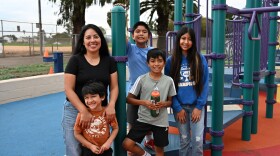MADELEINE BRAND, host:
This is DAY TO DAY. I'm Madeleine Brand.
MIKE PESCA, host:
And I'm Mike Pesca. Today, Pope Benedict the XVI walked down a red carpet to meet the prime minister of Turkey. Even though this trip has been planned for months, it wasn't clear until the last minute that the meeting between the pope and the prime minister would happen. That is because in September the pope quoted a 14th century text that referred to Islam as evil and inhuman.
In the protests that followed, some people in Turkey suggested that the pope cancel his trip. NPR's Ivan Watson is in Ankara and he joins us now.
Ivan, Turkish official were hoping that the pope would take this chance to maybe rescind those negative comments he made about Islam to endorse Turkey's entrance into the EU. And also on the table was the pope's desire to warm up to the Christian Orthodox community in Turkey. Were any of those goals met?
IVAN WATSON: Well this is just the first of a four-day visit, Mike. And it is the official state part, where the pope is meeting with government officials. He did, in a discussion with Prime Minister Erdogan, he is said to have endorsed Turkey's bid to become the first Muslim country to join the European Union. And that is significant because Turkey is really bogged down in really difficult negotiations right now with the EU. And also before the pope became the pope, when he was Cardinal Ratzinger, he spoke out against Turkey joining the European Union.
He has not gone out and referred to his controversial speech given last September. But he did meet with the top Muslim cleric in Turkey and called for brotherhood between Muslim's and Christians, for dialogue between both faiths.
PESCA: As a majority Muslim but officially secular country, has Turkey itself been walking a tight rope in terms of engaging the pope on religious issues?
WATSON: Well, one of the issues here are the freedoms of the tiny and dwindling Christian minority here. It's an ancient Christian minority. The ecumenical patriarch who is seen as the spiritual leader of the Orthodox Church in Istanbul, he's not even legally recognized by the Turkish government. And the pope did make a gentle call for religious freedom.
I know that the Orthodox Christians here would like to see their status improved as a result of this trip. Some of the fervent Muslims in Turkey, though, are quick to point out that they too feel that their religious freedoms are restricted by the secular Turkish government, that the government does not allow them to promote religious education the way that they would like; that the Turkish government in fact appoints the clerics who preach sermons around the country in mosques, and that the government in fact dictates what kind of sermons have to be read to worshippers around the country.
PESCA: In terms of how subtle the pope has to be with the religiosity question, is he saying prayers? Is he wearing a crucifix?
WATSON: When he arrived, he was not wearing a crucifix, when he first shook hands with Prime Minister Erdogan. And we've seen footage of Pope John Paul II's 1979 visit to Turkey, when he actually prostrated himself upon arrival in Turkey. So that is a different arrival. Since then, he has shown the crucifix.
There are going to be questions. For instance, will Pope Benedict make religious signs or display religious symbols when he visits the museum of Aya Sophia. That museum status is disputed because for a thousand years it was the most important cathedral in the Orthodox Christian Church. It was then converted into a mosque when the Ottomans conquered Constantinople 600 years ago. And for much of the last century it has been a museum. It's been a kind of neutral ground between the two faiths. And Turks will be watching closely to see just what this pope will do when he sets foot inside that very historic structure.
PESCA: NPR's Ivan Watson in Ankara. Thank you, Ivan.
WATSON: You're welcome, Mike. Transcript provided by NPR, Copyright NPR.





